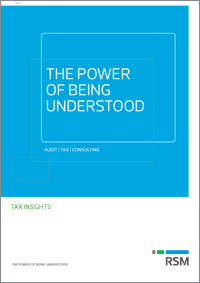On November 9, 2021, Belgium and France concluded a new double tax treaty (hereinafter: "the new treaty"). The old treaty - still in force at the moment - is one of the oldest treaties concluded by Belgium (1964) (hereinafter: "the old treaty"). The new treaty revises the old one on a few points, including the lump-sum foreign tax.
THE LUMP-SUM FOREIGN TAX, WHAT IS IT?
The lump-sum foreign tax has been much talked about.
The problem is as follows: a Belgian resident individual receiving dividends from a French source risks being taxed twice: once in France (at a rate of 15% - the rate provided for by the old treaty) and a second time in Belgium (at a rate of 30%). The total tax burden on a French dividend received by a Belgian resident would therefore be 40.50%. On a dividend of €100.00, the individual would only receive €59.50.
In order to avoid this double taxation, the old treaty provides for the imputation of a lump-sum foreign tax, under the conditions set by the Belgian legislation, without this lump-sum foreign tax being less than 15% of the net amount of the French dividend (i.e. after deduction of the French withholding tax). Thus, based on the current rates, the Belgian tax should remain limited to 15%, i.e. a total charge of 25.88%. On a dividend of €100.00, the individual should receive a net dividend amount of €74.12.
A SAGA THAT RESEMBLES A HOLLYWOOD MOVIE
This provision of the old treaty created a scenario worthy of Hollywood. At the end of 1988, Belgium abolished in its domestic legislation the imputation of the lump-sum foreign tax for Belgian individuals, reserving the granting of the lump-sum foreign tax to persons using the capital generating the income for their professional activity. Following this abolition, the Belgian tax authorities no longer applied the lump-sum foreign tax present in the old treaty, resulting in double taxation of French dividends for Belgian residents.
This position of the Belgian tax authorities has resulted in numerous judgments of the Court of Cassation, including a judgment of June 16, 2017 and October 15, 2020. In these judgments, also followed by the country's Courts of Appeal, the Court of Cassation refuted the position of the Belgian tax authorities.
The primacy of international law over national law requires Belgium to grant Belgian residents who receive French dividends the right to deduct a lump-sum foreign tax.
The Belgian tax authorities have always acted in disregard of these judgments, until the beginning of 2021 when, following a parliamentary question, the Minister of Finance indicated that, from now on, the tax authorities would comply with the case law of the Court of Cassation. This new position of the tax authorities resulted in a circular dated May 28, 2021, explaining in particular how to claim the lump-sum foreign tax.
The victory for private investors was short-lived. The new treaty has thrown a spanner in the works by abolishing the lump-sum foreign tax. As soon as it comes into force (January 1, 2023 at the earliest), Belgian residents will again have a heavier burden on French dividends received. Where the tax burden was finally lighter for a Belgian resident receiving French source dividends (25.88%) than for a Belgian resident receiving Belgian source dividends (30%), the balance is again reversed. For a French dividend of €100.00, the Belgian resident will now receive a net dividend of €61.04, i.e. a tax burden of 38.96%.
If you have any questions regarding this topic, don’t hesitate to contact our RSM Belgium | Tax team ([email protected]).
RSM Belgium | Tax

